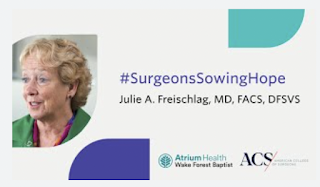Bryan Johnston, MD
In this essay, Dr. Johnston draws on a clinical encounter to show why he was drawn to his career in Family Medicine. He hopes graduating medical students will also find meaning and connections as they help other people throughout their careers ...
“Not doing too good, Doc. I buried my cousin last week,” he said, slouching in his chair.
“What happened?” I asked grimly.
“It was sudden, I don’t really know what happened.”
I murmured my regrets and a pause drifted over us. He and I had been meeting monthly for over a year and these moments had become part of our rhythm. He was still recovering from the loss of his son a few months ago, of an aunt last year. His tibia was still healing after a recent assault, his left orbit finally felt better after a pistol-whipping last year. His assailants had been after the most valuable thing he owned—the buprenorphine that felt like a firewall against the cycle of withdrawal and use he had clawed his way out of.
Trauma within trauma, grief upon grief
These moments matter to me because it is in them that I feel I can be of real use. To be of use, to me, is a concept marrying intrinsic and extrinsic needs along a trajectory of development. It is a way of seeking to understand and respond to needs you see that you feel called to and capable of meeting. It is a way to acknowledge what fulfills you, to build skills and experiences toward sharpening the impact you can make in doing those things. It can be a framework allowing you to infuse yourself into your work and also into humanity.
Family Medicine and its proximity to meaningful relationships, behavioral health, and wellness, to community, and to health equity drew me in like whatever attracts songbirds to fly north in springtime. Over time, I gained skills in addiction medicine, trauma-informed care, social determinants of health screening and intervention, and system-level advocacy, always with a growing sense of being of use.
My patient had required all these skills and more, a high level of need but also a high level of mutual fulfillment in meeting that need. After I had found a pharmacist willing to dispense an early refill of buprenorphine after his last assault, he humbly thanked me and told me that he had never trusted a doctor before.
“How’s your family doing?” I asked.
“They’re ok, I talked to my father this morning and he’s taking it ok.”
“And how are you holding up?”
He laughed then shook his head. “It’s a lot, Doc. It feels like I’m surrounded by death.”
We reviewed his support system, how he was coping with his suffering, checked his mood and screened for suicidality, then turned to the devastating impact of stacking grief and trauma. After months of coaxing, he had agreed to make a therapy appointment but had to miss it due to the funeral. He agreed to reschedule it.
“I know you’re a private person. But nobody can hold all that in. This is not a normal time you’re going through; this may be the hardest time in your life.” The buprenorphine was helping him, and he had not used. There were some positive things amidst the difficult parts, and we spent a few minutes focusing on that. “Be gentle with yourself right now,” I told him as we stood up.
“Ok,Doc,” he said, then shuffled off.
I left the room feeling not sorrow, but deep well-wishes and gratitude for our relationship, for the intimacy we had shared, for the trust enabling support in this critical time. Above all, I felt that I was right where I needed to be -- at the intersection of skill, experience, and need; in short, that I had been of use.
Medical learners often talk about what they want to do in the future
These conversations can take a short or long time, but most often avoid the core bits which underlie who we are, what we have come to understand about ourselves, and the connection we hope to have with others, with the world. In medicine we speak in symbols, we ourselves are symbols for who we are. I say I am a Family & Addiction Physician committed to health equity, and you can imagine several things about me. You might say you are going into Orthopedic Surgery, or Psychiatry, and others may intuit things about you.
What I want to say is that you are a dynamic person, and it’s possible for the most important parts of you to come together in a future in which you are generating meaning for yourself and others by being of use in a way that is yours alone.
Thank you for who you are and all the good you do now and in the future. And— enjoy the ride.
(Patient details changed to protect identity)
Bryan Johnston, MD, is a Family & Addiction Medicine Physician, and an Assistant Professor in the Department of Family & Community Medicine at MCW.




